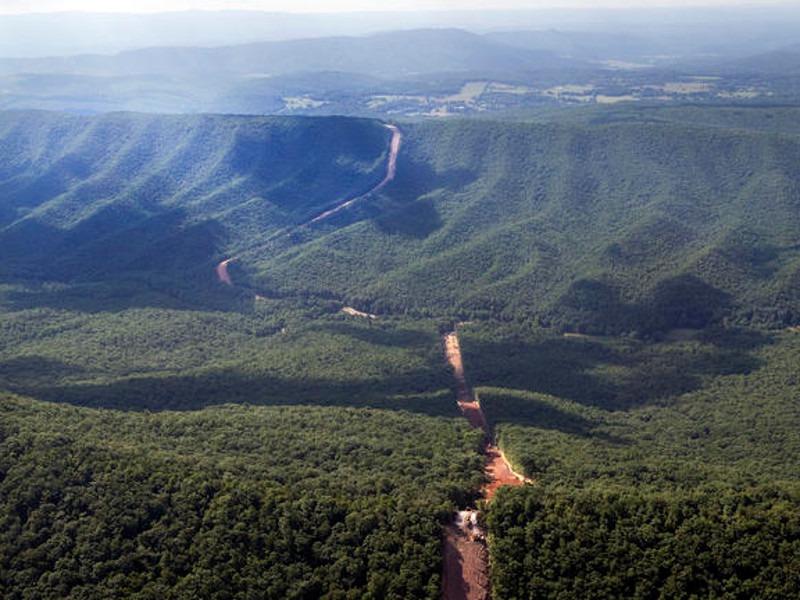The ruling, said one organizer, “uplifts the tireless efforts of every single coalition member and volunteer fighting to protect land, water, and people.”
By Jessica Corbett Published 4-4-2023 by Common Dreams
A U.S. appellate court panel on Monday unanimously struck down a key water permit for the Mountain Valley Pipeline, a nearly completed fracked gas project long opposed by people living along the over-300-mile route through Virginia and West Virginia.
Three judges from the U.S. Court of Appeals for the 4th Circuit vacated a Clean Water Act certification from the West Virginia Department of Environmental Protection (WVDEP), without which the U.S. Army Corps of Engineers cannot allow ongoing MVP construction at stream and wetland crossings
“The certification reflected the department’s conclusion that MVP’s activities during the pipeline’s construction would not violate the state’s water quality standards,” the panel said. “Disagreeing with that determination, landowners and members of various environmental organizations in the state have petitioned for this court’s review of the department’s certification. We find the department’s justifications for its conclusions deficient and vacate the certification.”
The MVP gained national attention last year because of efforts by U.S. Sen. Joe Manchin (D-W.Va.) to force the completion of the pipeline as part of his thrice-defeated “dirty deal” on permitting reforms. House Republicans, who recently passed their own fossil fuel-friendly energy package, are also now pushing for legislation to finish the project.
While Manchin said Monday that “it is infuriating to see the same 4th Circuit Court panel deal yet another setback for the Mountain Valley Pipeline project and once again side with activists who seem hell-bent on killing any fossil energy that will make our country energy independent and secure,” MVP opponents praised the decision.
“Today’s ruling uplifts the tireless efforts of every single coalition member and volunteer fighting to protect land, water, and people,” said Russell Chisholm, managing director for the Protect Our Water, Heritage, Rights (POWHR) Coalition. “MVP should abandon their ill-fated project because we will defend every stream and river crossing that can still be saved from permanent harm.”
Today, the U.S. Court of Appeals for the 4th Circuit denied key permitting for the #MountainValleyPipeline, saying the project failed to meet WV state water quality standards.
— Fridays For Future U.S. (@FFFUnitedStates) April 4, 2023
Incredible work from @POWHR_Coalition and organizers fighting MVP 🔥https://t.co/qes4IJ7WPG
Several campaigners stressed that damage has already been done during the construction of the incomplete pipeline.
“MVP has already gone too far in damaging West Virginia’s water resources, particularly in some of our most valuable mountain headwater systems. WVDEP clearly cannot make a good conscience argument that MVP will not further violate water quality standards,” said West Virginia Rivers Coalition executive director Angie Rosser.
Similarly charging that “West Virginia communities have endured Mountain Valley Pipeline’s damage to their water resources and environment for far too long,” Jessica Sims, Virginia field coordinator for Appalachian Voices, agreed that “this ruinous project must be canceled.”
Along with violating water standards, this “disastrous” project “is already more than three years behind schedule, and billions over budget,” noted Sierra Club’s Patrick Grente. “With continuous legal setbacks, it has never been more clear that investors should stop throwing money at this doomed project and walk away.”
Bloomberg reported that the ruling likely thwarts plans to put MVP into service in 2023 and delays the project by at least a year.
Such great news for the fight against the Mountain Valley Pipeline.
— Jamie Henn (@jamieclimate) April 4, 2023
This crew has never given up, never believed that this project was 'inevitable,' and they're going to #StopMVP! https://t.co/R3LJrcJVaZ
“People need investment in clean, fossil fuel-free, nonextractive energy—not the MVP—and developers should cancel the project,” said Crystal Cavalier-Keck, co-founder of 7 Directions of Service, who was far from alone in pointing to the broader climate argument against continuing the pipeline, or any fossil fuel project, given scientists’ warnings.
Chesapeake Climate Action Network general counsel Anne Havemann declared that “we’re in a climate crisis and need to stop digging the hole deeper.”
“It’s time to move away from polluting fracked gas infrastructure projects such as MVP that harm our rivers and streams, rip through private property, and contribute to climate change,” Havemann said, “and move towards clean, renewable energy.”
This work is licensed under Creative Commons (CC BY-NC-ND 3.0).


